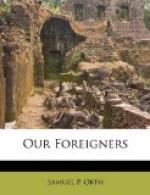To this method of estimating nationality, it will at once be objected that undue prominence is given to the derivation of the surname, an objection fully understood by those who made the estimate and one which deprives their conclusions of strict scientific verity. In a new country, where the population is in a constant flux and where members of community composed of one race easily migrate to another part of the country and fall in with people of another race, it is very easy to modify the name to suit new circumstances. We know, for instance that Isaac Isaacks of Pennsylvania was not a Jew, that the Van Buskirks of New Jersey were German, not Dutch, that D’Aubigne was early shortened into Dabny and Aulnay into Olney. So also many a Brown had been Braun, and several Blacks had once been only Schwartz. Even the universal Smith had absorbed more than one original Schmidt. These rather exceptional cases, however, probably, do not vitiate the general conclusion here made as to the British and non-British element in the population of America, for the Dutch, the German, the French, and the Swedish cognomens are characteristically different from the British. But the differentiation between Irish, Welsh, Scotch, Scotch-Irish, and English names is infinitely more difficult. The Scotch-Irish particularly have challenged the conclusions reached by the Census Bureau. They claim a much larger proportion of the original bulk of our population than the seven per cent included under the heading Scotch. Henry Jones Ford considers the conclusions as far as they pertain to the Scotch-Irish as “fallacious and untrustworthy.” “Many Ulster names,” he says,[5] “are also common English names.... Names classed as Scotch or Irish were probably mostly those of Scotch-Irish families.... The probability is that the English proportion should be much smaller and that the Scotch-Irish, who are not included in the Census Bureau’s classification, should be much larger than the combined proportions allotted to the Scotch and the Irish.”
Whatever may be the actual proportions of these British elements, as revealed by a study of the patronymics of the population at the time of American independence, the fact that the ethnic stock was overwhelmingly British stands out most prominently. We shall never know the exact ratios between the Scotch and the English, the Welsh and the Irish blended in this hardy, self-assertive, and fecund strain. But we do know that the language, the political institutions, and the common law as practiced and established in London had a predominating influence on the destinies of the United States. While the colonists drifted far from the religious establishments of the mother country and found her commercial policies unendurable and her political hauteur galling, they nevertheless retained those legal and institutional forms which remain the foundation of Anglo-Saxon life.




